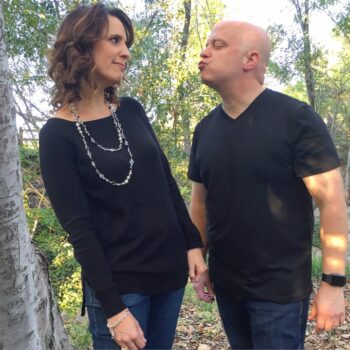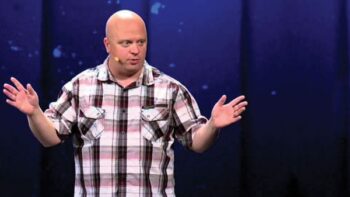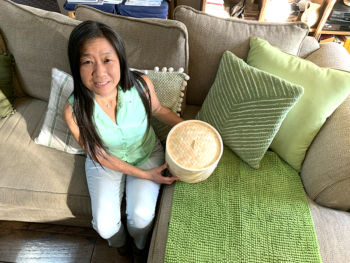 By Michael Ashcraft —
By Michael Ashcraft —
The ugliest thing Caleb Kaltenbach saw through a childhood of being taken to gay pride marches and wild parties was…. Christians holding up signs saying “God hates you.”
“I don’t want to have anything to do with that,” he said at the time. But Caleb came to Christ in high school, became a pastor afterwards and started a church that doesn’t compromise on truth while still extending love to those with “messy” lives.
His incredible journey from Christian-hater to loving Christian is more than just one man’s testimony. It is a shining light on the path for the church re-calibrating its message, as the world grows more worldly, to wooing sinners instead of saying “Woe!” to sinners.
When Caleb was only two years old, both his mom and dad divorced and “came out of the closet at the same time,” he says on an Outreach video. “My whole life I was raised by two lesbians and a gay man.”
His dad was professor of philosophy, law and rhetoric at the University of Missouri, Columbia, while his mom was a professor of English at the University of Missouri in Kansas City.
 “My whole life I was raised in the gay and lesbian community,” he says. “My parents didn’t want to get baby sitters, so they basically took me to parties when I was 4, 6, 7 years old. I went to camp outs, clubs and gay pride parades.
“My whole life I was raised in the gay and lesbian community,” he says. “My parents didn’t want to get baby sitters, so they basically took me to parties when I was 4, 6, 7 years old. I went to camp outs, clubs and gay pride parades.
“I hated Christians,” he remembers. “I didn’t want to have anything to do with Christians.”
At the end of a gay pride parade, he was met by Christians with placards that said “God hates you” and “Turn or burn.”
They were spraying water and urine on everybody.
Caleb, who was a young and impressionable 9 years old, turned to Mom and asked why they were doing this.
“Well, Caleb, they’re Christians,” she replied. “And Christians hate gay people. Christians don’t like people who are different from them.”
“I don’t want to have anything to do with that,” he replied.
 His next memory was when he was a teen, accompanying Mom to her parties. His custom was to find a room to play video games, Duck Hunt or Kung Fu (in the days of primitive video games — Atari, etc).
His next memory was when he was a teen, accompanying Mom to her parties. His custom was to find a room to play video games, Duck Hunt or Kung Fu (in the days of primitive video games — Atari, etc).
Louis, a well-built 30-year-old, befriended him at these parties.
Years later at the doctor, Caleb saw Louis, who had was emaciated and had strange markings on his forehead. Caleb asked what was wrong.
“Caleb, I have AIDS, and I’m getting read to die,” Louis responded.
Visiting him “a shell of the man he used to be” in the hospital just days before Louis died, Caleb witnessed a “horrifying sight.” As Louis shivered uncontrollably cold under nine blankets, his family watched unfeelingly from across the room.
“Plastered against the wall with their big ol’ KJV bibles out and looking like they expected a firing squad to come at them” was the compassionless immediate family. When he asked for water, they made sure to give him some without touching him.
“Why are they acting like that?” he asked his mom.
“Well, Caleb, they’re Christians,” she responded. “And Christians hate gay people. Christians don’t like people who are different from them.”
“I don’t want to have anything to do with that,” Caleb said again.
He went up to Louis, gave him a hug and a kiss and said good-bye.
By the time he got to high school, Caleb had a lively hatred for Christians.
Nevertheless, he went to a Bible study and persevered long enough to discover a radically different picture of Christ than the image projected by Christians when he was growing up.
“Jesus was different than most of the people holding up signs on street corners,” he remembers. “Jesus didn’t approve of sin but he rolled up his sleeves and got involved in the life of people.”
He got saved and went home and told his parents. They grounded him.
Not long after, through studying the Word of God, he realized that sex was the exclusive domain of the married couple, man and woman. So he informed his parents. They kicked him out.
He lived with other people. Caleb attended Bible college in Kansas. He preached in a church of 20 people in a town of 50.
He invited his mom, and she came.
“I was so excited to live out the tension of grace and truth,” he says.
Mom didn’t come back and two Sundays later, the elders of the church ordered Caleb to never again invite “someone like that.”
“We’re not that kind of a church,” the elders told him.
Caleb preached his last sermon there and directed his frustrations to God.
“God, I want a church filled with people, who are struggling with their sexuality, who are in gangs and people who are depressed and who are using and drinking and people who are having marital problems and people who are less than perfect,” Caleb prayed. “I want everybody because the church is a mosaic of broken lives brought together to glorify Him.”
Today, Caleb pastors in Southern California such a church and has written the book Messy Grace: How a Pastor with Gay Parents Learned to Love Others without Sacrificing Conviction.
When Mom called, saying her partner Vera was dying of cancer, Caleb flew out to be with her. Of course, he prayed for the opportunity to present the Gospel to her, but Vera wound up rejecting the message of salvation by faith and grace after a few days.
“Caleb, I think you’re weak,” she told him. “People who rely on Jesus are weak.”
In 2010, Caleb and his wife moved to Texas to pastor. Within a year, both Mom and Dad — separately of each other — moved to Texas and began attending the church.
In 2013, he left pastor Discovery Church in Simi Valley, CA, but two weeks before taking that assignment, Caleb witnessed both Mom and Dad go up to the altar to receive Jesus. They still struggle with temptation but believe in Jesus and try to go to church, despite Christians occasionally making them feel bad for their downfallings.
 “How do all these things go together? I don’t know,” Caleb says. “Part of living in the tension of grace and truth is that it’s not your job to resolve it. We’ve got to embrace the tension of grace and truth and love ‘messy’ people. We’ve got to create a culture where you can belong before you believe.”
“How do all these things go together? I don’t know,” Caleb says. “Part of living in the tension of grace and truth is that it’s not your job to resolve it. We’ve got to embrace the tension of grace and truth and love ‘messy’ people. We’ve got to create a culture where you can belong before you believe.”
If you want to know more about a personal relationship with God, go here




Thanks for this positive message among-st this very negative time of trial.
Comments are closed.